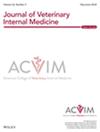Long-Term Response of Equids With Pituitary Pars Intermedia Dysfunction to Treatment With Pergolide
Abstract
Background
Limited data document long-term responses of equids with pituitary pars intermedia dysfunction (PPID) to pergolide treatment.
Objectives
Report clinical response, medical problems, outcome, and owner satisfaction with pergolide treatment of PPID-affected equids over 14 years.
Animals
Thirty client-owned equids with PPID.
Methods
After completion of an open field clinical efficacy study for Prascend® (pergolide tablets), 28 horses and two ponies were enrolled in an extended treatment study (13 receiving 2 μg/kg PO q24h and 17 receiving 4 μg/kg PO q24h). Clients were interviewed every 3 months and equids were re-evaluated after 2.5, 3, 3.5, 4.5, 5.5, 6.5, 9.5, 12.5, and 14.5 years of treatment.
Results
Five equids died and 24 were euthanized (five for chronic laminitis) during the study period (median survival time, 3.6 years; range 0.6–10.5 years). Seven of 13 equids had a dosage increase to 4 μg/kg PO q24h (maximum study dose) between 1.7 to 4.7 years of the study. After 5.5 years, owners of 13 surviving equids reported sustained clinical improvement and endocrine test results normalized in 75%. After 9.5 years of treatment, only two of six surviving equids had normal endocrine test results.
Conclusions and Clinical Importance
Long-term treatment of PPID-affected equids with pergolide produces clinical improvement in nearly all affected animals and normalization of endocrine test results in some cases. Furthermore, this extended treatment study determined that equids can respond favorably long-term to the initial pergolide dose, rather than needing a progressive increase in dose over time.


 求助内容:
求助内容: 应助结果提醒方式:
应助结果提醒方式:


